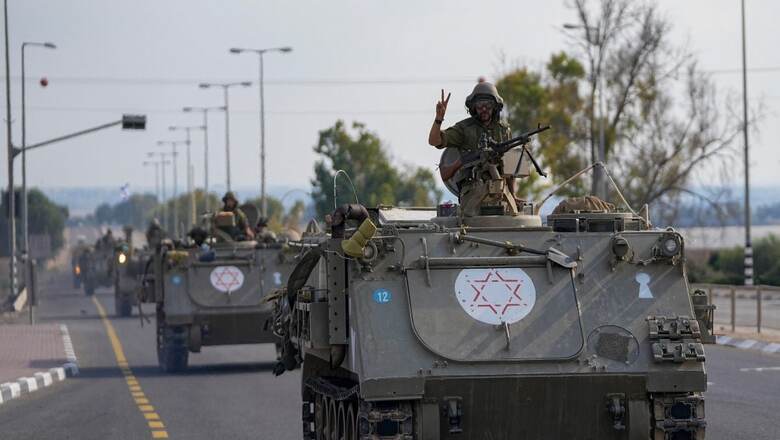
views
The sheer number of arms and ammunition recovered from the 1,500-odd Hamas terrorists killed in the Israeli fightback in the border towns and villages over the past 10 days is mindboggling. Images on TV of rows upon rows of assault rifles and pistols, rockets and rocket launchers, grenades, other ordnance, body armour and protective gear are grisly proof of both the preparation and intention of the highly motivated and trained jihadis who stormed in to kill and be killed.
The arms and ammunition or the components needed to make them were brought into Gaza somehow, through Israeli and Egyptian border checkpoints as well as by sea. That points to complicity. The fact that despite the pounding by Israeli defence forces for 9-10 days, rockets are still being fired from there (as attested by foreign media reporting from there) points to a well-entrenched force. And that cannot happen without local knowledge if not necessarily approval.
Apart from the obvious question of how Israeli intelligence services did not know about the existence of the weapons and ammunition, let alone how they were procured or manufactured, there is also the issue of whether the Palestinian community from whose midst Hamas operates were also unaware. After all, Hamas terrorists are not sui generis; they are the fathers, uncles, brothers and sons of families in Gaza and live and carry on their terror work among them.
These are the very same families who have lost non-Hamas members in the past 10 days because of the relentless retaliatory Israeli attacks on Gaza. These are also the same families who are now suffering due to lack of food, water, electricity, fuel and medical supplies. This indicates that Hamas terrorists put their Islamist ideology over the wellbeing of their families. That they are continuing their rocket attacks—ensuring Israeli retaliation—underlines that fact.
Israel told Palestinians living in northern Gaza to move southwards presumably to reduce the number of casualties from air strikes and the ground attack, whenever that begins. But Hamas told residents to stay put, which shows that they want to use their own Palestinian brethren as human shields, as well as capitalise on the images of death and destruction that inevitably follow Israeli strikes. What kind of people want their own families to stay in an active war zone?
There are increasing media reports featuring children from Gaza clearly traumatised by the devastation and death caused by the Israeli bombardment. However, there are hardly any reports of the impact of those hours of Hamas terror on the Israeli children who survived the attack. Are Israelis not inclined to publicise the mental distress of their young? Or, are most media organisations less interested in the impact on Israeli children than Palestinian ones?
Humanitarian agencies have been speaking about the undoubtedly dire situation in Gaza and urging Israel to desist, but they barely comment on what is gradually coming to light about what happened during the hours of murderous mayhem wrought by Hamas on those living in Israeli villages. Entire families wiped out in their homes—shot, hacked, burnt—people killed in cars and even at a party in the desert. Why are “humanitarian” workers less interested in them?
The question also arises whether Gaza’s residents approve of the ideology that the members of their families who are part of Hamas espouse: the death of all Jews regardless of age or gender, the total destruction of the state of Israel and the establishment of an Islamic state. Or are they so terrorised by Hamas and its fanatical leaders (even if they are members of their own families) that they dare not voice their opinions and concern about murdering Jewish civilians?
Or did—do—they believe that the murder of 1,300 or so Israelis in villages including babies and grannies by terrorists from their Gazan families is justifiable but Israel’s retaliation which has also killed Gazan babies and grannies is not? Judging by the remarks on TV and social media by Gaza residents who have been through the Israeli bombardment, there is little sympathy for dead Israelis as it is seen as a tit-for-tat for “75 years of Israeli occupation and repression”.
The term used to criticise the Israeli bombardment of Gaza is “collective punishment”—Gaza’s civilians should not be made to pay for Hamas’ actions. There is merit in that argument, but it cuts both ways: The Jewish babies, grannies, villagers and partygoers had nothing to do with the actions of the Israeli state, so why avenge state repression by killing innocents? If that is in any way justified, then so is the bombardment of Gaza and its colossal collateral damage.
Then there is the matter of 200 hostages still held by Hamas. These hostages are not combatants—many if not most of them are civilian men and women of all ages besides, children and toddlers; several are old, without access to medicines. Hamas is not known for its hospitality towards people who have done them no wrong. The very act of taking hostages—after butchering their family and friends, often in front of their eyes—has revealed their dishonourable intentions.
Hamas has already announced the deaths of at least 20 hostages, allegedly due to the Israeli air strikes on Gaza. There is no reason to believe that is how those hostages were killed, given that many were injured and even unconscious when they were kidnapped. There is little hope that they were given any medical aid in captivity. And painful as it is to contemplate, fair treatment of hostages let alone Vienna convention norms cannot be expected from a terrorist organisation.
The recovered weaponry reiterate it was a pogrom against Jews, diabolically well planned and executed with astounding secrecy and precision. The hostages have been taken by a fanatical Islamist enemy that does not believe in compromise or compassion. Given the battlelines drawn between these two communities, the Israeli retaliation has also ended up like a pogrom, albeit as a result of the actions of Hamas terrorists. That portends no speedy resolution or reconciliation.
Everyone knows that a negotiated settlement is the only way out of this situation. But for that to happen, extremist elements on both sides—Palestinian (i.e., Hamas and Islamic Jihad) and far-Right Israeli parties—have to dial it down. A viable modus vivendi in the Promised Land depends on terrorists and extremists of every kind being cut out of the picture so that sane people on both sides can get on with the task of finding a way to live side by side, in peace if not in friendship.
The author is a freelance writer. Views expressed in the above piece are personal and solely that of the author. They do not necessarily reflect News18’s views.

















Comments
0 comment